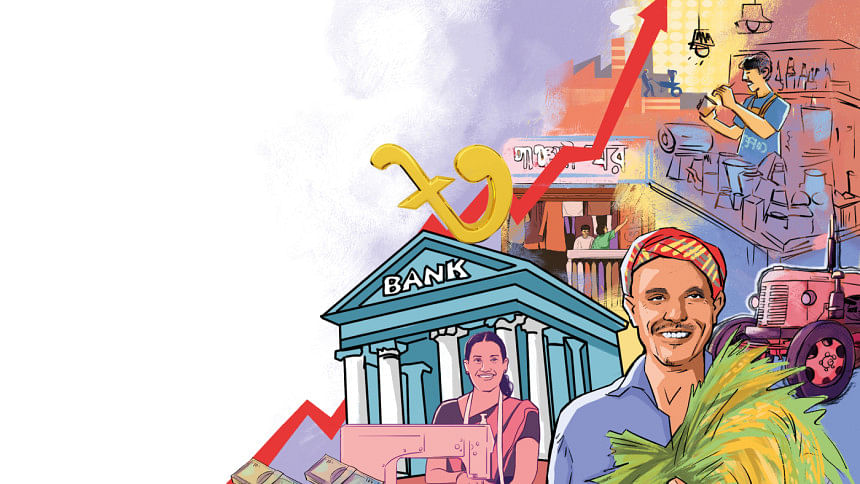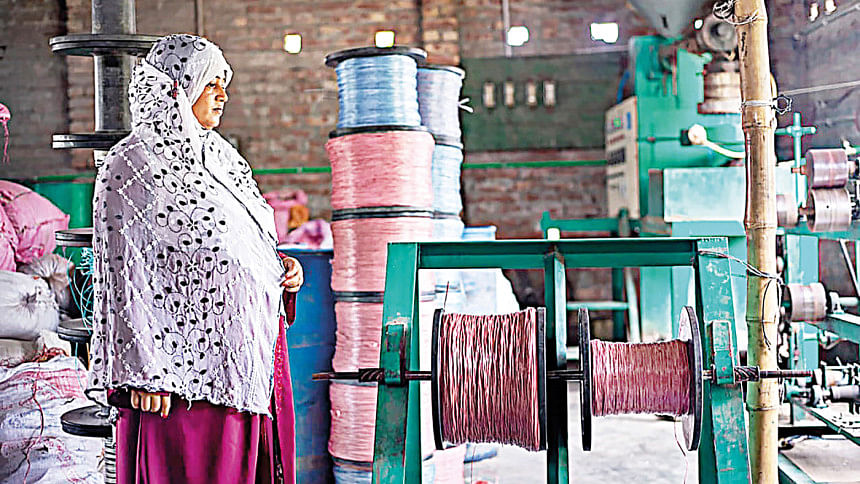Small Enterprises, Big Impact: Why MSMEs matter more than ever

The micro, small, and medium enterprises (MSME) sector is central to Bangladesh's pursuit of inclusive development and sustainable industrialisation. With high labour intensity and modest capital needs, MSMEs not only drive economic growth but also balance regional development, create jobs, reduce poverty, and promote gender equality. Despite efforts by the government, banks, and NBFIs, the sector faces persistent structural challenges. According to the draft National SME Policy 2025, Bangladesh has around 7.8 million MSMEs employing 21 million people. They make up 99% of all businesses and 80% of the workforce, yet their GDP contribution remains disproportionately low.
Barriers to Growth
One of the most prominent obstacles is the misalignment between intended credit allocation and actual disbursement. Dr Mainul Islam, former professor of economics at Chattogram University, explains that the low rate of non performing loans in the SME segment contrasts with far higher bad loan levels in industrial and corporate portfolios. "The extent of loans that is supposed to reach the SME sector is not actually reaching it," he warns. He calls for a legislative mandate compelling banks to allocate at least 25 percent of total lending towards SMEs.
This call to action underpins the National SME Policy 2025, which aspires to raise industry's contribution to national income to 40 percent by 2027. By protecting and nurturing domestic industries and positioning MSMEs as the primary engines of industrialisation, the policy aligns with Bangladesh's Five Year Plans, the nation's planned graduation from LDC status by 2027, and the United Nations' Sustainable Development Goals. These frameworks underscore the SME sector as a crucial pillar in the country's socio economic landscape.
Formal Finance vs Informal Borrowing
Banks and NBFIs perform a pivotal role in formalising the financial lives of MSME entrepreneurs. In the absence of formal credit channels, many small business owners resort to NGOs or local moneylenders, often at exorbitant interest rates. This over reliance on informal borrowing can trap entrepreneurs in vicious cycles of debt, severely limiting their capacity for long term economic advancement.
Bangladesh Bank's latest Quarterly Statement of SME Loan Disbursement (October–December 2024) reveals that 386,907 CMSMEs received loans totalling BDT 62,580.78 crore, and 88,260,04 enterprises repaid BDT 57,234.03 crore. These figures indicate both the sector's considerable appetite for credit and the rhythm of repayment—though there remains substantial room for deeper outreach.

Banking the Backbone: Institutional Perspectives
BRAC Bank, widely regarded as one of the country's most SME focused institutions, has served around two million CMSMEs since 2001, disbursing an impressive BDT 200,000 crore in loans. Managing Director and CEO (current charge) Tareq Refat Ullah Khan explains that BRAC Bank's mission goes beyond lending: "Our goal is greater than just being a lender—we aspire to be the complete financial partner for grassroots entrepreneurs."
Banking experts highlight that loan access is just the first step. Adequate documentation, verified accounting, and the knowledge to transact safely within formal systems remain recurring challenges. Sheikh Mohammad Maroof, MD & CEO of Dhaka Bank, describes a joint initiative with Bangladesh Bank and the SME Foundation: "We deliver financial literacy and entrepreneurship development programmes to enhance business acumen and credit readiness among MSMEs. Furthermore, we actively participate in credit guarantee schemes designed to mitigate lender risk and encourage broader access to credit."
Empowering Women Entrepreneurs
Women led MSMEs face distinct barriers—from lack of collateral to time constraints and social norms. To bridge this gap, banks and NBFIs have crafted tailored products. IDLC Finance's Managing Director & CEO, M Jamal Uddin, highlights the "Purnota" loan product: "Women led MSMEs often face deeper barriers. With our dedicated Purnota women entrepreneur loan product, we not only provide loans with favourable terms but also offer mentorship and training."
Echoing this commitment, Ali Reza Iftekhar, MD & CEO of Eastern Bank, points to "EBL Mukti", the country's largest collateral free loan exclusively for women owned businesses: "EBL has signed agreements with Bangladesh Women Chamber of Commerce & Industry and the Chittagong Women Chamber of Commerce & Industry. Our SME loan designed for women entrepreneurs named 'EBL Mukti' is the country's highest collateral free woman owned business loan."
Bridging the Coordination Divide
Despite these successes, many stakeholders agree that isolated interventions cannot fully catalyse change. Coordinated policy, data integration and ecosystem wide reforms remain essential. Trust Bank's Managing Director & CEO, Ahsan Zaman Chowdhury, underscores this need: "The path forward requires coordinated effort across all stakeholders. We need expanded credit guarantee schemes that give banks confidence to increase collateral free lending. A centralised digital MSME registry connected to NID and tax systems, as well as credit risk scoring, would revolutionise how we assess and serve these businesses."
Role of Policy Reform
A legislative requirement for SME directed lending—such as the proposed 25 percent quota—would compel banks to maintain balance between credit to large scale corporates and grassroots entrepreneurs. Simultaneously, mandating large industrialists to source funds through the stock market rather than banks could reduce systemic risk and discourage non performing loans.
The National SME Policy's target of a 40 percent industry share by 2027 is ambitious but achievable given the scale—and resilience—of MSMEs. Coordinated reforms across licensing, credit guarantee schemes, digital identity frameworks, tax incentives, and financial literacy campaigns can unlock latent growth.
Moreover, public private partnerships—with development agencies, donor organisations and fintech innovators—must converge around joint capacity building, market linkage and cluster development initiatives.
As the nation moves towards Graduation from LDC status and the realisation of the SDGs, the MSME sector must be at the heart of the journey. With strong coordination among the government, regulators, banks, NBFIs, NGOs, and the entrepreneurs themselves, MSMEs can truly drive Bangladesh forward—into a future defined by shared prosperity, innovation, and sustainable growth.

 For all latest news, follow The Daily Star's Google News channel.
For all latest news, follow The Daily Star's Google News channel. 



Comments